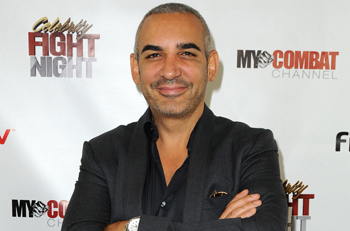FilmOn Founder Committed to "Poking the Giants in the Eye"
The ad-supported, hybrid OTA/Internet service streams local and network broadcasts and lots of on-demand content, mostly for free, but pays for the privilege.
NEW YORK--Alki David, the Greek billionaire behind the hybrid over-the-air/Internet service FilmOn, is always up for a good fight if he believes he's right. He wants people to know that despite the Supreme Court decision basically shutting own the Aeero multichannel video service, and the many lawsuits he himself has had to fight, he and his company is sticking around because, he said, he wants to "truly put the control of content in the hands of the people."

FilmOn Founder Alki David says he's not doing anything illegal. Before the court decision, FilmOn had filed an Amicus brief in support of Aereo, but the brief said that should Aereo lose, companies like FilmOn should be regulated as a small cable system (as the Supreme Court decision characterized Aereo's service) offering public performances (as a cable company does) and thus be able to retransmit local TV station content by paying a retransmission fee.
"I called Barry [Diller, a chief investor in Aereo] out about not paying license fees or any kind of contribution to satisfy copyright rules," David said in a phone interview from his home in Greece. "They maintained that they are a unique technology platform and they should not have to pay royalties or retransmission fees. We understand this is the wrong strategy to take."
David has not always been a supporter of Aereo. In fact, when Aereo was launched in New York City at the end of 2011, he rolled out "a better version" and first called it the "Barry Driller" and then the "Aereo Killer." Then when Aereo sued him, David owned (and still does) the rights to the name "Aero," a TV tuner technology. So, he rolled out "aero.tv" just to stick it to Aereo. In the end, however, both parties walked away and began supporting each other's efforts. David said it was all done in jest.
"In the same way that a television manufacturer or TV tuner maker does not pay a license for content, Aeero put themselves in the same boat," David said. "But of course, that isn't the case, and they know that. If you call it for what it is, Aereo is most certainly a system whereby there is serving of content involved. And by doing that, it implies that you are more than just a technology provider. You are also a hosting service."
The FilmOn service currently streams local and network broadcasts for free. It also provides, for free, 600 linear channels of licensed content (sports, news, movies, autos, travel, video games) and some 45,000 titles on demand; as well as social TV and mobile apps. [David owns the largest private collection of movie titles in the world; including classics by Hitchcock, Kubrick, Huston and Capra.] The company also offers a premium service that provides HD quality and increased DVR time, and a handful of pay channels.
Get the TV Tech Newsletter
The professional video industry's #1 source for news, trends and product and tech information. Sign up below.

Both Aereo's service and FilmOn use remote micro antennas to receive the broadcast signals. Now with the Supreme Court ruling, FilmOn has moved the local and network broadcasts behind a pay wall in order to qualify for a compulsory license under the Copyright Act of 1976—since the Court designated services like Aereo and FilmOn as cable companies. Alki has said this was the best route in the past and has now refiled the paperwork to comply.
Both Aereo's service and FilmOn use remote micro antennas to receive the broadcast signals. FilmOn also uses remote computers—they call it "Teleporting—which allows the user to view broadcast signals in another city—legally via the same process you might share a screen via Skype. So, right now subscribers (and there are 40 million monthly unique users worldwide; about 20 million of those are in the America) can watch local broadcast TV in 18 different cities from anywhere in the United States. Users can watch New York area major networks too (because that's the only region free of an injunction in favor of the networks).
Despite the Supreme Court decision, Aereo could still conceivably go for a compulsory license, but many say its business model does not provide for additional revenue to cover the expense. With 40 million unique monthly users of its service world wide—and advertising revenue on all of that—it can afford to pay the networks royalties.
"I have always been willing to pay royalties," David said. "I've been in the entertainment business a long time and own a lot of content. In fact, we license 98.2 percent of the content on the platform. The majority of the content is subsidized by ads."
For those that tried to bring 'Net Neutrality into the Aereo case (even David called the court decision "a blow"), David said the Aereo case is "not about 'Net Neutrality and not about Aereo, really. It's about the behavior of the big media companies. But with the behavior of the big media companies, there's a very real risk that a handful of conglomerates will ultimately controlling all of the content that is freely available in the mainstream marketplace. That's not good for the consumer.
"Consumers' minds have changed about content and how they want to use it. But the majors are continually trying to shove that genie back into the bottle. That's where the discussion of Net neutrality related to it comes into play. The Supreme Court decision against Aereo is a blow to the very idea, but indirectly."
What the Aereo case does do, David said, is make it harder for new media companies to be successful.
"For a company like Netflix to be creative today is dramatically harder than it ever has before," he said. "It is almost unlikely that a media & entertainment company can become as big as Netflix without innovation. The cost of getting to market is prohibitive, the access to content is prohibitive and the access to infrastructure (online and over the air), the stuff that rightfully belongs to the people. But in this case it has been taken away from the people.
David said he's not overly confident about surviving the current climate but "we are confident that we'll be able to keep poking the giants in the eye. That's all I've been doing since 2010."
To be successful today, companies have to forge good strategic partnerships, David said, and mentioned FilmOn's business relationships with Intel, Google, Lenovo and others.
"Today there are many players looking to come together to create a force to be reckoned with," David said. "As much as there are old media companies that have interest in the online world, there are plenty of new media companies and plenty of new partnerships to be made. I believe my company has done that. We're well funded, because I'm fortunate enough to have enough money to stay in the fight and follow the vision, so we're not done yet."
He mentioned that FilmOn might have to find a buyer ort merge with another larger company in order to stay competitive in today's television landscape.
"I've been in talks in the past about merging with other companies, and I do see a time when we might have to consider becoming larger and stronger with the help of a major partner," he said. "I look into my heart and if I honestly feel that what I am doing is right, exciting and innovative, then it's worth it. I try not to be the judge of whose moral compass is moving in the right direction. When I look at mine, I think I'm okay.
"The amount of times I've heard that FilmOn is going to be shut down in the media is actually quite funny," David said. "I don't have any more fingers to count the number of times I've been sued. And I expect to be sued a few more times before I'm through. But I feel in my bones I am right in what I am doing and that I'm not doing anything illegal."
